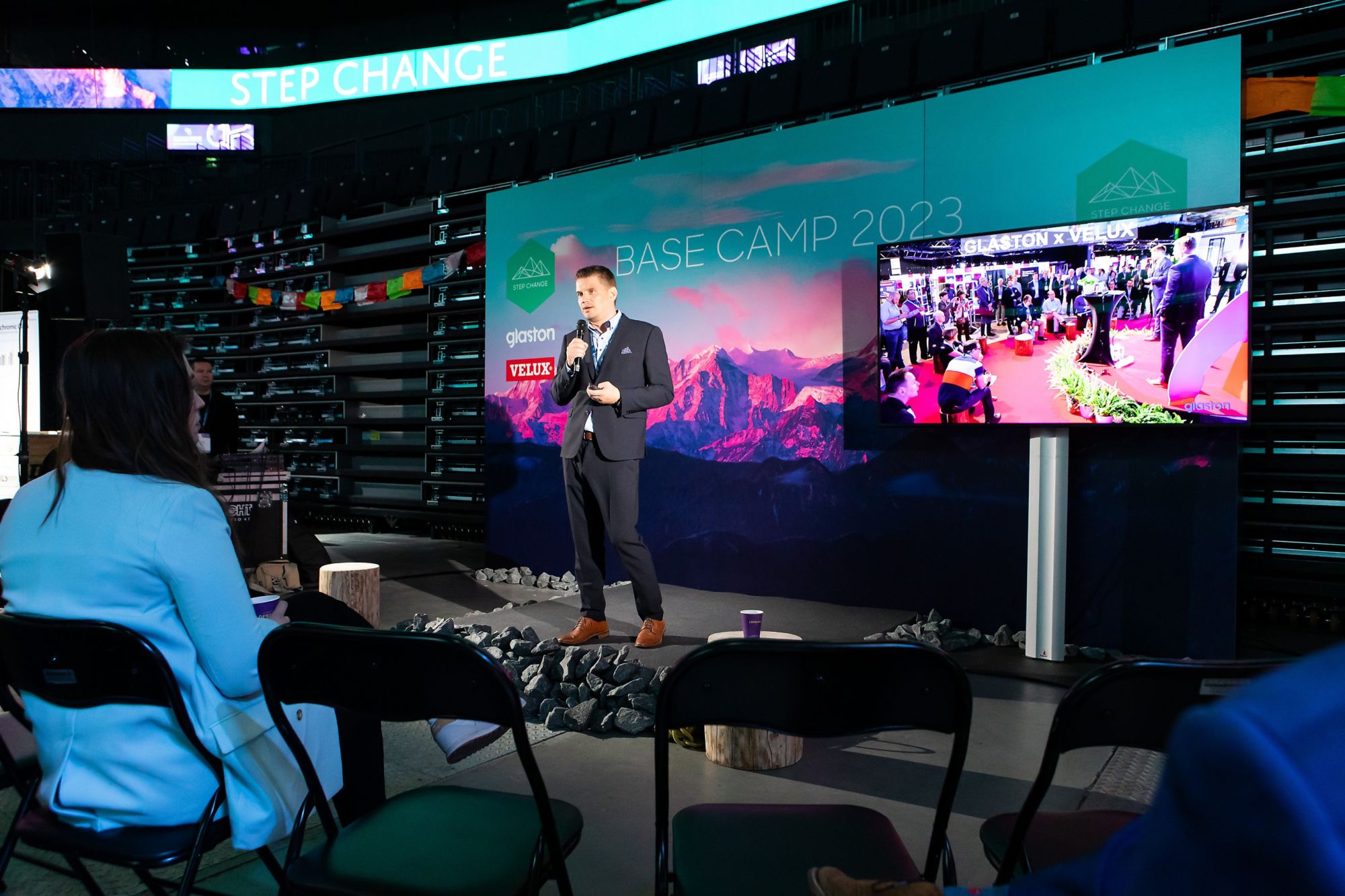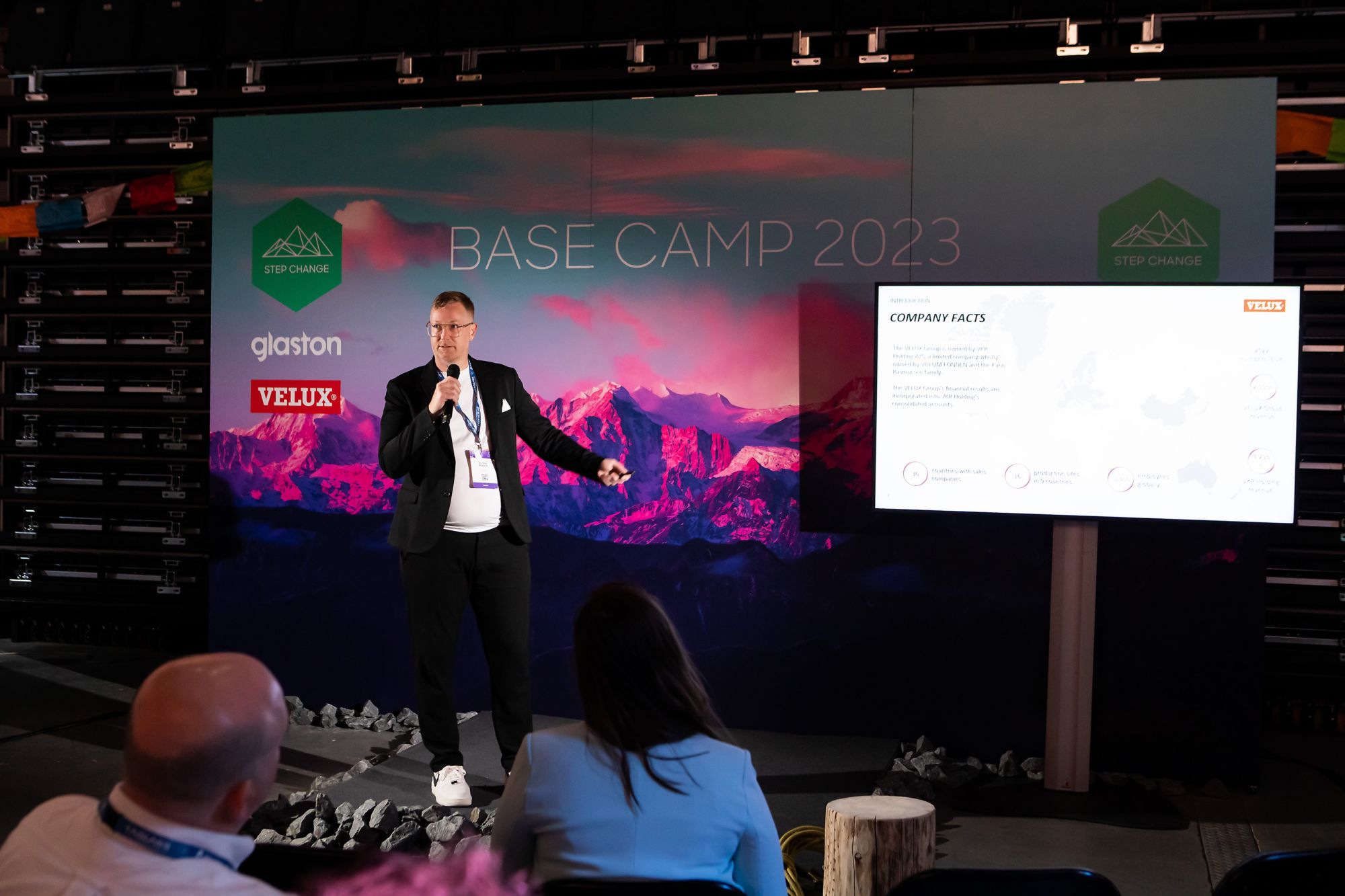Step Change, a new integral pillar of the Glass Performance Days (GPD) 2023 conference, brought together visionary pioneers in glass innovation for the third time since its inception. This year, VELUX Group joined Glaston to host this special event to accelerate sustainable innovation in the glass industry. Twelve trailblazing startups joined the initiative, adding a new dimension and angle to the conference program.
First introduced by Glaston at GPD 2017, Step Change has established itself as an unparalleled platform, fostering the promotion of innovations across the entire glass industry value chain. It serves as a bridge between ambitious startup and scaleup entrepreneurs and industry professionals from around the globe.
“Step Change Base Camp is the place where emerging companies can share knowledge and learn from the wisdom of the experienced and vice versa – and prepare for the ascent to success. It centers around advancing the glass industry through the exchange of ideas and networking – bringing together the right people with the right technology to the right spot to enable faster deployment,” said Glaston’s Chief Sales Officer Sasu Koivumäki when opening the event.
“By proactively accelerating networking opportunities among startup and scaleup entrepreneurs and mature glass industry players, new revolutionary business ideas have evolved,” Sasu continued. “This year, we are pleased to have VELUX cosponsoring the Step Change event. This allows us to bring in end-user value to the picture as well.”

Tyler Leighton Moersch, Ph.D. Lead Specialist in Advanced Material Technology at the VELUX Group, joined in: “To improve the clock speed of our industry, we need to make big leaps, aggressive moves – step changes. And it is only by joining forces that we can propel the glass industry toward an inspiring future of progress.”
“This is what took us to the Step Change Base Camp 2023,” he continued. “Startups and scaleups are very good at making aggressive promises to drive sustainability development. After all, they have to work amazingly fast to survive – and that’s what attracts and inspires us.”
“Today, there is a clear call for newer and more efficient technologies. And we actually do have them all here at Step Change – all those important technological breakthroughs that are needed to achieve a carbon-free world in 2050,” he said.

The program continued with 12 inspiring presentations from each of the participating companies. Along with bringing their innovations to the personalized and eco-conscious booths, each company had a chance to present its innovation from the stage to a crowd of glass business professionals and enthusiasts.
2MH Glas presented their patented rapid ion exchange technologies that enhance the sustainability and performance of glass products. In just 5 minutes, rapid ion exchange achieves the same strength as the traditional process after several hours. This innovation is all about making glass more affordable, thinner and lighter, while also more resistant to scratches and breakage.
AeroShield Materials introduced their transparent silica aerogels that enhance the performance of insulated glass. These lightweight materials offer superior thermal insulation, fire resistance and a lower carbon footprint compared to traditional glass.
eLstar Dynamics stepped in as a cutting-edge developer of adaptive smart glass solutions for more energy-efficient buildings and transportation. By using existing manufacturing facilities, eLstar is able to produce smart glass with much lower energy and impact on the environment.
Hypermemo presented their advanced GlaserTM laser technology. This proprietary short-pulsed CO2 laser with high peak power enables one-pass processing of common glass types, resulting in clear and stress-free edges. The improved edge strength reduces the need for post-processing and equipment footprint, contributing to more efficient and environmentally friendly glass processing.
IR Dynamics showcased its thermochromic nanoparticle technology to control solar heat gain. This low-cost glass coating reduces heating and cooling costs in buildings, contributing to lower CO2 emissions. By improving the energy efficiency of new or existing windows, IR Dynamics aims to make buildings more comfortable and sustainable.
Lithium Designers proudly presented the world’s first technique for automated freeform facade planning. Additionally, the company’s implementation of in-house 3D-printed nodes is also unique worldwide. With these novel solutions, the company aims to minimize the freeform facades planning effort and manufacturing costs.
MIMSI Materials spoke about their Alumenate® material that extends the performance of low-emissivity coatings beyond the limits of even the most advanced today’s Low-E coatings. The company’s deep-tech innovation provides considerably enhanced optical, electrical and durability properties to glass.
Miru Smart Technologies came out with the next-generation electrochromic windows (eWindows). Miru’s patented manufacturing process is disrupting the way eWindows are produced. The solution aims to significantly lower costs, improve performance and reduce embedded and operational carbon emissions.
Peafowl demonstrated to the visitors their revolutionary dynamic cells that transform photon light into electricity. Through self-powering and tinting functionality, the Plasmonics technology enables energy-saving and smart windows.
Tynt displayed Reversible Metal Electrodeposition (RME) technology using metal films to control light and heat flow through windows. This allows for climate-friendly windows that adapt to changing needs throughout the day by optimizing natural light and providing precise glare control.
VideowindoW attracted visitors with their unique, responsive and entertaining glass facade. The company’s solution transforms glass facades into transparent media platforms, combining immersive entertainment, glare control and climate control. This innovative technology, providing shading as a service, is already installed in airports.
Volframi introduced a new vacuum coating process with no traditional glass and equipment size limitations. The innovative process makes targeted coatings on a glass pane without having to process the entire glass. By using only partial surface processing, it is possible to create completely new and competitive solutions within the glass processing industry.
Read more about the Step Change Base Camp 2023 and its participants here.